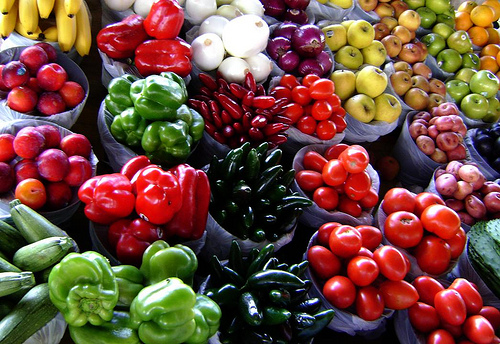We’ve already talked about ways to save more money while you’re grocery shopping here, but can you take that a step further? Of course you can! I’m always searching for ways to save even just a little extra cash at the grocery store, and I’ve come up with this list of tips that might be helpful to keep in mind if you’re trying to do the same. Combining these ideas with the ones we’ve shared in the past have allowed me to cut my grocery bill in half, and the savings just keep growing!
Learn more about how long most things typically last. It’s helpful to know when commonly used items tend to expire. You wouldn’t want to buy pounds and pounds of meat (unless you’re freezing it, see below) for two people if you won’t be able to use it all up before it goes bad. Get an idea for how long items will last in your fridge, as well as things like canned or dry goods in your cabinets, in order to avoid excessive waste. It’s also a good idea to clear out everything that IS past its prime so 1) it doesn’t contaminate other items and 2) so you know what you’ll need to buy or replace when you hit the grocery store.
Be smart about storage. Use the appropriate storage mode for longer-lasting freshness. Airtight Ziploc bags are great for freezer storage, as are some plastic and glass containers (be sure to check that they’re freezer-safe first). Containers are also a great way to store leftovers, turning one meal into two! Also consider where your groceries should be stored to keep them the freshest – in the refrigerator, freezer, at room temperature on the counter, or somewhere dark and dry.
Buy what you need. I think this used to be one of my worst shopping habits! My cabinets would look like they were running low, so I’d fill my cart at the grocery store. While it’s ok to stock up on non-perishable items that are commonly used, be careful about how much you buy when items are likely to spoil or expire faster, such as produce, milk, and meat. There’s nothing worse than spending your hard-earned money on items, only to throw them into the trash later.
Cook or freeze food that’s nearing its end. Sometimes I’ll buy an assortment of perishable items with plans to use them for specific meals, but if my week gets hectic, I might need to alter my schedule. This might mean swapping out more time-cosuming stuffed peppers for a quick baked chicken dish. If I haven’t used those peppers by the end of the week, I’ll chop them up and freeze them for later, or I’ll make a quick stir-fry over the weekend, because I know that if I don’t, they’ll just end up going bad. Use those items up before they need to be thrown out! **A simple Google search will tell you what can and can’t be frozen for later (you’d be surprised at what’s possible!). My favorite freezer items are fresh fruits, they make great smoothies!
Keep an eye on it! This is a problem that almost seems silly, but we ran into it frequently at our old house. We would bring all of our fresh produce home and store it in the refrigerator to help keep it fresh for longer. Sometimes, though, we would forget about it because our crisper drawers were not transparent. Out of sight, out of mind! With our new fridge, all of our fruits and veggies (among other items) are visible through clear drawers. We also have more shelves that allow us to see what all we have, and what is readily accessible. A good organization system can help with this!
Do you have any tips for making your food last longer? What have you found that does or doesn’t work well?

